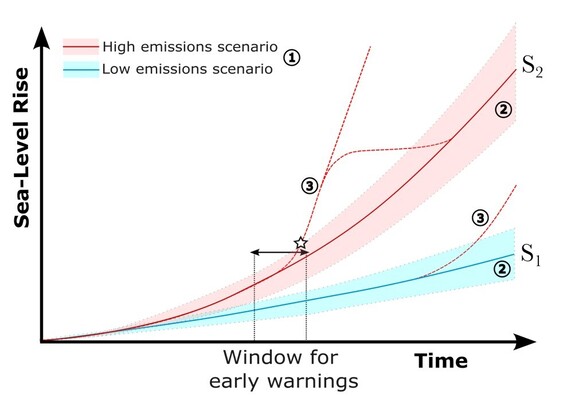Tim Hermans1, Renske de Winter*2, Joep Storms3, Frances Dunn4, Renske Gelderloos5, Ferdinand Diermanse2, Toon Haer6, Dewi Le Bars7, Marjolijn Haasnoot2,4, Ymkje Huismans2,5, Loes Kreemers8, Eveline van der Linden7, Stuart Pearson5, Roelof Rietbroek9, Aimée Slangen4,10, Kathelijne Wijnberg11, Gundula Winter2, and Roderik van de Wal1,4
1IMAU, Utrecht University; 2Deltares; 3Department of Geosciences and Engineering, TU Delft; 4Department of Physical Geography, Utrecht University; 5Department of Hydraulic Engineering, TU Delft; 6Institute for Environmental Studies, VU Amsterdam; 7Royal Netherlands Meteorological Institute (KNMI); 8Knowledge Centre Society and Law, Amsterdam University of Applied Science; 9Geo-information Science and Earth Observation, University of Twente; 10NIOZ Royal Netherlands Institute for Sea Research; 11Civil Engineering & Management, University of Twente
* Corresponding author: Renske de Winter (renske.dewinter@deltares.nl)
Introduction
Adapting to future sea-level rise (SLR) is an interdisciplinary challenge (Oppenheimer et al., 2019). However, the interaction between scientists studying different aspects of this challenge is often limited. For instance, studies on SLR projections are typically presented at NAC, but studies on hazards and impact at the NCK Days. Additionally, academic research activities are not always connected to the needs of policy makers and vice versa, expectations of policymakers on which uncertainties will be reduced in the (near) future do not necessarily line up with what researchers consider to be feasible.
Objective and Methods
To address these concerns, we organized a workshop in June 2024 that gathered 22 scientists and policymakers. The goals of the workshop were to stimulate collaboration between communities in the Netherlands, develop a common research agenda, and harmonize research activities across related researched fields. In preparation for the workshop, a questionnaire was sent out to participants to obtain their perspectives on which uncertainties in sea-level research are most important and what is needed to reduce them. During the workshop participants were asked to discuss the interacting uncertainties across three different disciplines: sea-level projections, hazards and impacts, and adaptation. After the workshop, a literature-based overview was made of the most important uncertainties in each of these disciplines. Next to that, we explored how and to what extent these uncertainties can be reduced and which aspects require more certainty in order to better prepare the Netherlands for future sea-level conditions. Insights obtained from this literature assessment and discussions during the workshop were collected in an integrated perspective paper (Hermans et al., under review).
Results
Based on the workshop, we developed a perspective on the most important uncertainties in each discipline and the feasibility of managing and reducing those uncertainties. We find that enhanced interdisciplinary collaboration is urgently needed to prioritize uncertainty reductions and increase the relevance of science to adaptation planning.
In the coming decades we expect that significant uncertainties will remain or newly arise in each discipline and rapidly accelerating SLR will remain a possibility (see Figure 1). Therefore, we recommend investigating how early warning systems for adaptation can help policymakers to make timely decisions under remaining uncertainties. Given the importance of interdisciplinary collaboration, we will share our perspective at both the NAC (20-21 March 2025), NCK-days (19-21 March 2025) and potentially other conferences attended by communities dealing with sea-level rise.

Figure 1: Schematic projections of mean SLR for a low (S1, blue) and high (S2, red) emissions scenario (Category 1). The shading around S1 and S2 depict quantifiable uncertainty (Category 2). The red dashed lines represent deep uncertainty (Category 3) related to tipping behaviour that may lead to a (temporary) departure of mean SLR from S1 or S2. The star indicates when such a departure may emerge from the quantifiable uncertainty of the projections, and the black arrow the time window in which early warnings of this departure may be received.
References
Oppenheimer, M., Glavovic, B. C., Hinkel, J., van de, Wal, R., Magnan, A. K., Abd-Elgawad, A., et al.: Sea level rise and implications for low lying islands, coasts and communities. In H.-O. Pörtner, et al. (Eds.), IPCC special report on the ocean and cryosphere in a changing climate, 2019
Hermans, T.H.J., R.C. De Winter, J.E.A. Storms, et al. An Integrated View on the Uncertainties of Sea-Level Rise, Hazards and Impacts, and Adaptation. Authorea. December 16, 2024.
DOI: 10.22541/au.173437064.40047859/v1 under review Coastal Futures










